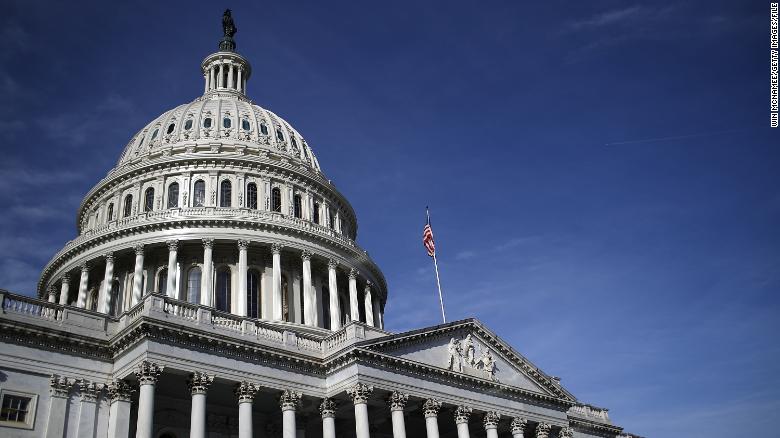(CNN)Senate Republican leaders are struggling to secure a majority of their conference to vote for a massive budget deal, something that could be an embarrassment for President Donald Trump, especially after House Republicans voted en masse against the deal his administration cut.
Republican senators told reporters Wednesday that the final vote was now expected Thursday. GOP leaders are confident the bill will pass this week but they will need to have Democrats provide a large number of votes to meet the 60-vote threshold it needs to pass.
Senate Majority Leader Mitch McConnell wouldn't directly answer if more than half his caucus would vote for the bill, only replying to CNN: "It's going to pass."
Sen. John Thune of South Dakota, the Republican whip, also would not say, an unspoken acknowledgment he expects it to fall short of what was a key goal for Senate GOP leaders and the White House.
"We're working that issue and we feel confident in the end, we'll pass the budget," Thune said.
"I think in the end an issue like this is always going to be a combination of Democrats and Republicans, both sides," Thune said, when asked what message would be sent if more Republicans vote against the bill than for it. "Whenever you negotiate something like this, both sides have a lot invested in it, so I think both sides will be delivering a significant number of votes."
Senators are trying to clear other key items off the chamber's to-do list before senators leave for a five-week Senate recess, putting Republican rank-and-file up against a wall where some will have to decide whether to back the President's $2.7 trillion budget deal or face the ire of a President who hasn't taken kindly in the past to defectors.
GOP leaders are not giving passes for "no" votes and the goal is still to convince half or more of the conference to vote for the budget deal. Leaders want to avoid a show like the one in the House where there was a massive Republican uprising against the package negotiated by Treasury Secretary Steven Mnuchin and blessed by the President.
And it's not just congressional leaders. A GOP source close to the process told CNN that Trump, Vice President Mike Pence and Secretary of Defense Mark Esper have made a small handful of calls to GOP senators to talk about the budget deal. Esper especially has focused his calls on trying to explain to members that $738 billion and $740 billion in defense spending in year one and two might respectively fall a tad bit short of the Department of Defense's hope for $750 billion in their strategic planning memo, but that the certainty that the money is coming makes up for the small shortfall. That has been a concern for some Republicans.
Sen. John Cornyn of Texas, a member of GOP leadership, said the Senate would stay in session Thursday, in part so the Judiciary Committee can vote on an asylum reform bill, drafted by Sen. Lindsey Graham, that is planned Thursday.
"I think that'll probably be tomorrow," Cornyn said Wednesday about the budget vote. "We've got a Judiciary Committee markup tomorrow on the asylum bill, and then I think we'll be prepared to finish up our work and leave town."
Graham, a Republican of South Carolina who the chairs the Judiciary Committee, rejected the idea that his asylum bill was a reason to stay, however. "That would be news to me if those two were linked," he said.
The job of wrangling "yes" votes got harder for GOP leaders when Sen. John Kennedy, a Republican from Louisiana, who was leaning against the bill, announced publicly he would vote "no."
"It does add additional money for defense," Kennedy said. "But I view if from a different perspective. I think we could have done a much better job, or at least tried harder, to save money."
Kennedy predicted the bill will pass but couldn't say if more than half his GOP colleagues would support it.
"Yeah, I just don't know with how many Republican votes," he said. "I think you'll see more than just a handful vote against it for the reasons I just articulated."
Many conservative Republicans worry the package is just too expensive.
"At the end of the day, there's tremendous amounts of new spending, way over and above what we need to secure our national defense," said freshman Sen. Josh Hawley, a Republican from Missouri. "I think it's irresponsible and not for any clear purpose beyond the defense portion, which I support."
Sen. Cory Gardner, a Republican from Colorado up for reelection next year, said he is concerned "it's just a lot of money and at some point, things become so free, we can't afford it."
One GOP senator on the fence acknowledged that some of his colleagues would like to vote against it to publicly demonstrate they are fiscally prudent while privately hoping it passes so there can be orderly governing out of Washington.
"There are a lot of people who will vote 'no' who hope to heck it passes," said the senator, who did not want to be identified.
There were other issues at play too in holding off the budget vote.
A GOP aide said at least one (unnamed) Republican senator is traveling back to the Capitol and they are waiting for that person to return before they vote on the budget.
Other aides indicated there is some sensitivity in the Republican ranks about voting late at night because they might be criticized for passing an expensive budget "in the middle of the night" and out of public view. There are also concerns about leaving Washington for a long August recess on a Wednesday instead of working a regular full week, which for the Senate usually ends on Thursday.
This story has been updated with additional developments Wednesday.




